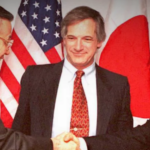May 27, 2016—
The 1994 Agreed Framework was the result of negotiations between the United States and the Democratic People’s Republic of Korea (DPRK) over the course of nearly two years. Signed on October 21, 1994, the goal of the agreement was to freeze North Korea’s suspected nuclear weapons program.
April 8, 2016—
A survey study of 233 of the United States’ top Asia/Korea experts, government officials, scholars, and opinion leaders found that domestic stabilization, not nuclear weapons, ranks as the #1 issue for the U.S. with unification (i.e., highest composite score in the entire survey in terms of most acute lack of knowledge/most acute concern for U.S. interests). The top four blind spots for the U.S.: 1) domestic stabilization; 2) nuclear weapons; 3) economic development; 4) cost.


